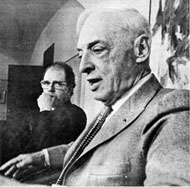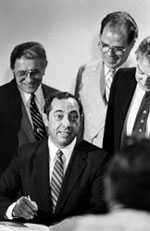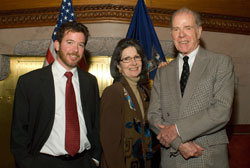Biography
Born in 1928 and raised in Albany’s North End, William Kennedy attended Public School 20, Christian Brothers Academy, and Siena College prior to pursuing a career in journalism. He joined the Post Star in Glens Falls as a sports reporter and, after being drafted in 1950, worked for an Army newspaper in Europe. Upon his discharge he joined the Albany Times Union as a reporter. In 1956 he accepted a job with a newspaper in Puerto Rico, where he met and married Dana Sosa, a Broadway actress and dancer. The Kennedys have three children: Dana, Katherine, and Brendan, and seven grandchildren.
Kennedy became founding managing editor of the new San Juan Star in 1959, only to quit in 1961 to work half-time as weekend editor in order to write fiction full time. His journalistic background has continued to inform his writing. In Quinn’s Book, Kennedy explores transitioning from reporting to fiction through journalist Daniel Quinn, who ponders: “All that I had written for Will and the Tribune seemed true enough, but a shallow sort of truth, insufficiently reflective of what lay below … The magnificent, which is to say the tragic or comic crosscurrents and complexities of such lives, lay somewhere beyond the limits of my calling … I was so busy accumulating and organizing facts and experience that I had failed to perceive that only in the contemplation of mystery was revelation possible; only in confronting the incomprehensible and arcane could there be any synthesis.”

William Kennedy and Saul Bellow
|
In 1960, Kennedy took a course at the University of Puerto Rico with novelist Saul Bellow, who modestly recalled his role in helping get Ironweed published years later: “Oh, I don’t know, someone would have recognized Kennedy—someday. It didn’t take long for an old dog like me to know Kennedy was the real thing, even in 1960, when he was a student of mine in Puerto Rico ... What happened to him is going to fill a lot of writers with hope and enthusiasm.”
Kennedy had expected to find inspiration for his fiction in Puerto Rico, but discovered that Albany held a stronger claim on his imagination. He returned to Albany in 1963 and wrote a series of articles on the slums, poverty, politics, black life, and the history of the city’s neighborhoods for the Times Union; and for some of these his editors nominated him for the Pulitzer Prize. The neighborhood articles provided the basis for his history of the city, O Albany! (1983).
Kennedy described his return to Albany in a 2006 interview for The Believer with novelist Edward Schwarzchild: “When I left Puerto Rico in 1963 and came back to Albany, I felt totally isolated. I had no friends who cared about literature. I also had to do something … to pay some bills. So I started to freelance … I was the apprentice in those years, trying to learn how it [fiction writing] was done and I sought out established writers to profile, and pick their brains … I also remember the importance of making it all real—the world of publishing and writing—because it was only a fantasy world for me when I was in Europe and Puerto Rico.”

Mario Cuomo signing the Writers Institute bill with State Senator Tarky Lombardi, William Kennedy and Assemblyman William Passannante standing behind.
|
On the heels of the simultaneous publication of Ironweed and the republication of Billy Phelan’s Greatest Game and Legs, Kennedy’s annus mirabilis began. Two days before his 55th birthday, January 16, 1983, he was awarded a MacArthur Foundation Fellowship of $264,000, liberating him from any need for additional income for five years. That same week the three novels received major reviews all over the U.S. The following January he received notification he had received the National Book Critics Circle Award, and in April the Pulitzer Prize, both for Ironweed. The Pulitzer was awarded the same day his grandson Casey Rafferty was born. Kennedy was also a finalist for the PEN/ Faulkner Award for Fiction that year. Among other honors received in 1984, he was awarded a Regents Medal of Excellence from the State University of New York and a New York State Governor’s Arts Award. The three novels were subsequently published in 28 countries.
Another part of Kennedy’s MacArthur award went to the institution of his choice, the University at Albany, specifically to bring writers of all types to the Albany campus. The University made a commitment to match those funds and in 1984 Governor Mario M. Cuomo signed into law the legislation creating the New York State Writers Institute, giving it goals and responsibilities to conduct a broad range of cultural and educational literary activities, with an additional annual funding of $100,000. The Institute has brought some 1,200 writers of every stripe to read, lecture, and teach students and the public, all events free, since it began.
Kennedy was elected to the American Academy of Arts and Letters in 1993, and the American Academy of Arts and Sciences in 2002. He has received many literary awards, including the first Eugene O’Neill Lifetime Achievement Award, the F. Scott Fitzgerald Literary Award, and was named a Commander of the Order of Arts and Letters in France. He is a member of the Academy of Motion Picture Arts and Sciences, PEN, and the Writers Guild of America.

Brendan Kennedy, Dana Kennedy and
William
Kennedy at State Author State Poet awards 2008
|
Kennedy has received numerous honorary degrees, and was presented with the inaugural SUNY Medallion of Distinction in May 2012 by the Chancellor of the State University of New York, and so joined the ranks of the SUNY Distinguished Academy as a board-appointed Distinguished Professor.
Kennedy lectured in creative writing and journalism from 1974 to 1982 at the University at Albany, becoming a full professor in 1983. He taught writing as a visiting professor at Cornell University during the 1982-1983 academic year.
In 2003, The University at Albany acquired the William Kennedy Papers, a collection comprising some 70 boxes of manuscripts, film scripts and memorabilia. The collection is maintained at the University at Albany Libraries’ M.E. Grenander Department of Special Collections and Archives as a resource for scholarly research on Kennedy’s work and career, and on the social, political, and literary histories of the Capital Region.
Following the 2004 premiere of the Legs Diamond-inspired orchestral work “Eyeball High” by Kevin Beavers, Albany Symphony Orchestra music director David Alan Miller commissioned another piece from Beavers, “Roscoe: Concerto for Violin and Orchestra,” which premiered April 20, 2007 at the Palace Theatre in Albany. Kennedy appeared on stage reading selections from his 2002 novel Roscoe, which served as preludes to sections of the concerto. Miller and the ASO organized nearly two months of readings, discussions and city tours of William Kennedy’s Albany around the premiere to celebrate the author. “He’s taken what he knows best ... and has elevated it into high art,” said Miller. “He sings the song of Albany.” The concerto was recorded in Brooklyn in 2009 by the Knights Ensemble as “Roscoe: for violin, narrator, and orchestra, on a text by William Kennedy / Beavers.”
 |
Kennedy has been the subject of several films. ‘William Kennedy’s Albany’ was directed by filmmaker Richard Rogers, in 1992 and distributed nationally by PBS. It is a long look at Kennedy’s focus on the city of Albany in all his work, and ‘Fortune Cookie’, directed by the French filmmaker Catherine Berge in 1993, for French and Canadian television, and focused on his career. In the summer of 2013, a film about Kennedy will air as part of the series “Irish Writers in America,” produced by CUNY-TV.
On October 3rd, 2011 Albany PBS affiliate WMHT broadcast the premier of the 30-minute documentary entitled “William Kennedy’s Prohibition Story.” In this WMHT original production, produced by Dan Swinton, Kennedy delivers an impromptu narration of the tale of gangster-bootlegger Jack (Legs) Diamond and his fatal conflict with Democratic political machine boss Dan O’Connell, who created a formidable local bootleg empire during the Prohibition era. The local broadcast of the documentary coincided with the release of the national PBS series by Ken Burns entitled, “Prohibition: America’s Greatest Experiment.”